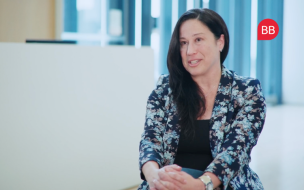As more companies turn to analytics to enhance their practices, professionals who can make sense of data and use it to solve real-world problems are becoming increasingly valuable.
For Taiwan-native Heidi Hsiao, studying for a Master of Management Analytics (MMA) provided her with the analytical foundation and industry exposure necessary to launch her career.
Now a consultant at Deloitte, Heidi spoke to BusinessBecause about how an MMA prepared her for the field.
1. Develop data analytics skills for business
By 2030, 87% of employers expect AI and big data to be the fastest-growing skill areas. As businesses rely more heavily on data to make decisions, the demand for professionals who can interpret and apply it effectively is set to rise.
For Heidi (pictured), the 11-month MMA program at the University of Toronto’s Rotman School of Management provided a structured pathway to gain technical proficiency and apply analytics in a business context.

“The program is very concise. The first half was focused on foundational tools like Python, SQL, and data visualization, while the second half was about applying those skills to real business problems,” says Heidi.
While the core curriculum helps students build a strong technical foundation, analytics is a broad and evolving field. To give them exposure to emerging trends, colloquium sessions introduce key topics such as AI ethics, cloud computing, and product management.
“I didn’t realize how useful the cloud computing session would be until I pursued an AWS [Amazon Web Services] certification later. Looking back, I realize how much it helped,” says Heidi.
A key component of the program’s hands-on learning is the practicum, where students bring their skills to tackle pressing business issues. Heidi’s team collaborated with Questrade, a Canadian online brokerage and wealth management firm, after its acquisition of Zolo, a real estate platform, helping to organize and present data in a way that gave executives a clearer view of business activity.
“Our goal was to build a dashboard that combined all those different data sources and present it to executives so that they could see how their business was performing across Canada,” she says.
Unlike most student projects that wrap up when the course ends, the dashboard Heidi and her team created is still in use at the company today.
Many practicum students have made an impression beyond their assigned projects. Pierre Montagnier, director of advanced analytics and data science in marketing at the Bank of Montreal, has seen firsthand the value they bring.
“Students come in with very strong analytics skills and the ability to apply them to real-life business problems. Over the years, I’ve managed to get a few MMA students to join my team, though it’s been tough because they’re in such high demand,” he says in an interview with Rotman.
2. Gain access to a global financial and business hub
Where you study can shape your career trajectory, influencing the connections you establish and the opportunities at your disposal after business school.
Rotman’s downtown location places students within easy reach of Toronto’s Financial District, home to Canada’s five largest banks as well as leading consulting and investment firms. With some of the country’s top employers just blocks away, students have direct access to significant networking and career opportunities.
“When I was choosing a program, one of the biggest draws was Toronto itself. Compared to other Canadian cities like Vancouver or Montreal, Toronto has the highest concentration of job opportunities,” says Heidi.
As Canada’s largest business hub, Toronto attracts global firms such as Deloitte, RBC, and Shopify. Many graduates choose to stay in the city, tapping into their business school network as they advance in their careers.
“Unlike in smaller cities, most people stay in Toronto after graduating, so it’s easier to keep in touch with friends and build a strong support network. It’s nice to have everyone still around,” says Heidi.
3. Cultivate a strong professional network that opens doors
Who you know can be just as important as what you know when it comes to securing job opportunities and advancing in your career.
With networking events, company visits, and industry panels scheduled throughout the year, Rotman MMA students have the chance to meet hiring managers and professionals working in data analytics and related fields, seeing firsthand the many ways data analytics is applied in business.
MMA students often come from a mix of academic and professional backgrounds, from engineering and mathematics to economics and commerce. This diversity means you’ll be learning alongside classmates with different perspectives and experiences—both in the classroom and during networking events.
“Student clubs at Rotman host a lot of great industry events, which gave me the opportunity to connect with alumni and potential employers in-person. When you reach out on LinkedIn, you might not get a response, and your personality just doesn’t shine through. In person, you can make an impression,” she says.
For many students, this exposure translates into career success. Rotman’s MMA program is ranked first in Canada for business analytics, and in the class of 2023, 97% secured employment within six months of graduation.
Rotman’s employer connections open doors to industry professionals, but career support is just as important in helping you prepare for the job search.
“We were each assigned a career coach at the beginning of the year. Your coach is there to support you at every stage, whether you need to work on your resume and cover letter or need help figuring out your career journey. If you had an interview coming up, they’d run mock interviews to make sure you’re prepared,” Heidi explains.
If you’re looking to break into data analytics, these are just three ways that a Master of Management Analytics can equip you with the technical training, real-world experience, and professional network to succeed.








